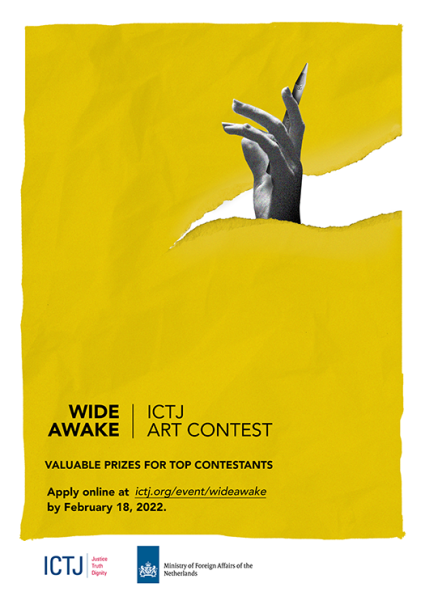New York, January 18, 2022— The International Center for Transitional Justice (ICTJ) is pleased to announce the “Wide Awake Art Contest,” an open call to Lebanese and Tunisian artists as well as artists living in Lebanon or Tunisia to explore the theme “the Sound of Dissent.” The contest will showcase works by those who are documenting and memorializing their communities’ stories in times of instability, resistance, and change.
Lebanon and Tunisia are grappling with economic crises marked by high unemployment, political mismanagement, and pervasive corruption. Both countries have also been hard hit by the pandemic, which has exacerbated people’s socioeconomic woes. Recently, Lebanese and Tunisian citizens, weighing the risks of contracting COVID-19 against the humiliations they have endured, have taken to the streets to denounce the state’s failures, corruption, and political instability and to call for concrete action to improve the economy.
In times of social and political turmoil, art can be a powerful tool to galvanize people, challenge authority, and demand change. In recent months, some artists in Lebanon and Tunisia have been courageously documenting the protests and telling their stories in real time. Their work has engaged and mobilized members of their communities on- and offline. Many other artists are deeply committed to creating work that addresses pressing socioeconomic and political problems in Lebanon and Tunisia and that amplifies the voices of those who are suffering most.
The Wide Awake art contest aims to spotlight some of these artists and changemakers. It invites emerging or mid-career Lebanese or Tunisian artists, including Tunisian and Lebanese expats, or expat artists based in Lebanon or Tunisia, to share an original artwork that deals with any of the myriad social, economic, and political dilemmas in Lebanon or Tunisia and explores the impact on society and, in particular, on marginalized communities and those who are otherwise vulnerable.
“We hope that the Wide Awake Art Contest will spark important conversations about ongoing inequality and exclusion in Tunisia and Lebanon,” explains Salwa El Gantri, head of ICTJ’s office in Tunisia. “We also hope it will bring attention to talented, socially conscious artists and encourage them and others to continue their vitally important work.”
Those who wish to apply should submit a completed application by February 18, 2022. Submissions will be evaluated based on creativity, originality, execution, and relevance to the theme. Following the contest, ICTJ will host an online exhibition and a final ceremony in Tunisia with selected finalists.
“Amidst the protracted economic and political gloom in Lebanon and Tunisia, the art contest will offer some light and fresh air to artists and young people and give them a safe space to reflect and create powerful, change-inspiring artwork,” says Nour El Bejjani, head of ICTJ’s Lebanon program.
